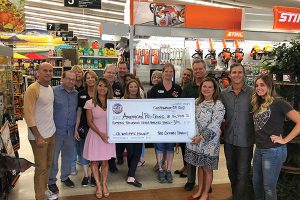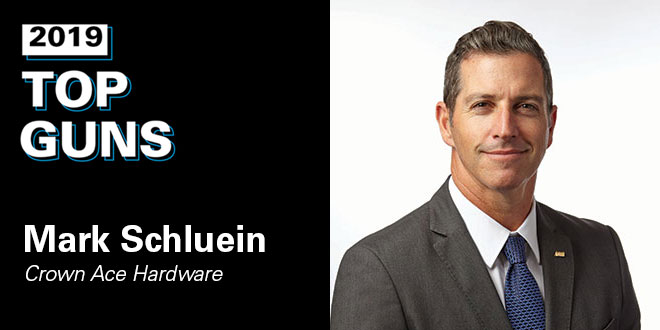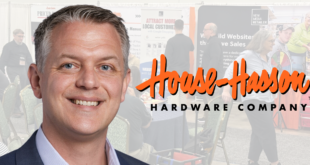Mark Schulein, President, Crown Ace Hardware, 18 locations in California, Arizona and Hawaii
Mark spent several years outside the industry before joining his father at Crown Ace Hardware in Orange County, California. Since that time, Mark has helped grow the business to more than 16 locations in three states through a deliberate growth plan.
Hardware Retailing (HR): What’s the history of Crown Ace Hardware, and how did you get involved? Was this your first career choice?
Mark Schulein (MS): This year marks the 70th anniversary of Crown Ace Hardware, which started in 1949 as a single independent store in coastal Corona Del Mar, California. There is a long, cool “American dream” entrepreneurial backstory that led my dad to be in the position to buy that store when I was a kid in the mid 1970s.
My story is a little different from my dad’s. I had the opportunity to follow my passions to college and came out with two degrees that have nothing to do with running hardware stores. However, I grew up working in retail outside the industry before spending some time in my areas of study.
Some people say, “If you love what you do, you’ll never work a day in your life.” That wasn’t true for me. Turning a passion into a job took the love out of it for me. That realization pushed me to rethink my path and ultimately led me to go into the business with my dad a couple of years after college. Today we have 16 locations in three states: California, Arizona and Hawaii with a couple more on the way.
When I was first considering the family business as an option, I received some really valuable advice from two successful businessmen who I greatly looked up to at the time. They both essentially told me that most people in business have a goal of owning their own company and that I had a chance most people do not have. They both said, “If you try it and it doesn’t work, so be it, but if you don’t try it, you are missing out on a potentially great opportunity.”
It took some time to find my footing in the business. Family business can be tough. I believe that one of my significant accomplishments in business is navigating the process of successfully—but not without its lumps—working closely with my dad for 20 years. It was hard, but it was a special opportunity that I learned an incredible amount from.
HR: What’s your advice for other retailers who are navigating the challenging parts of family business?
MS: My biggest recommendation is to find a trusted adviser to work as a go-between or moderator between family parties. Some groups go so far as to put together a board of directors. Whatever it is, it’s important to have some person, vehicle or process to assist in good communications to ensure that the business is strong and lasting while keeping focused on the family. We weren’t always that good at this, but in the end it worked out well and both our family and the business are vibrant, and I’m really proud of this.
My other recommendation is that you need a good pool of resources to lean on. Leverage relationships within the industry. I’ve been blessed to have built an incredible group of friends in the industry, and I heavily rely on the advice and ideas that we’ve shared or I’ve borrowed from over the years. Trusted partners and friends are invaluable in the family business equation.
HR: How were you able to expand into such diverse areas?
MS: Our hub was all in Orange County, California, until about 12 years ago. All of our stores were within 40 miles of each other, which made the operation relatively simple. But our growth opportunities in this trade area were limited so we became more opportunistic and looked wider and further. We purchased a four-store chain east of us in inland California and in Lake Havasu, Arizona. We knew how to operate multiple locations, so we just needed to figure out how to do so from a distance and assimilate those stores into our stable.
I went to college in San Diego, so we saw opportunities there. It was a logical next expansion area, but a single store in a new trade area is inefficient, so we looked to build a small hub. Now we have three stores in San Diego.
Our operation in Hawaii is on the island of Kauai, and it has served the north shore there for over 30 years. Island Hardware is a great little store, and it’s a passionate and important part of the community. We worked closely with the previous owner to make sure it was the right fit.
It’s been a great location for us; it’s a great work destination. We have learned a lot from that store when it comes to logistics, freight and staffing. It’s in a small-town environment, which we don’t have in our other stores because they are in such densely populated areas. It’s really wonderful to be such a core part of the community. We’ve been able to do some cool things there.
We are currently in the process of acquiring a two-store operation in another trade area in California where we see more growth opportunity, which will bring our store count to 18.
HR: What’s your approach for introducing yourselves to a new team when you buy a new store?
MS: My full intent from the very beginning is to be in lockstep with the seller. The previous owner is the one who has the relationships and has been known in the community likely for a very long time. It’s super important to me that the seller can genuinely tell their team, “Crown is the company I’ve chosen to pass the torch to,” and be able to tell them the reasons why.
If a team hears that from the seller, then that’s a huge leg up.
One of the things I always have in the back of my mind when we go into acquiring and assimilating a team is that the industry benchmark says that somewhere in the ballpark of 40 percent of employees will leave during a merger. Change is good, but it’s not always easy. When we go into new operations, we are hyper-focused on ensuring a smooth transition for the benefit of the team and the community.
People are going to be concerned about what this change means for them, so we strive to mitigate any concerns right out of the gate. We talk about what we stand for, our core values, and we really try to be conscientious about what a team member will be concerned about in a positive way. We try to share the why, the how and that we’re here to do no harm. At the same time, we provide new opportunities for growth, for relocations, if desired, for new ideas and for fun. We are big believers that work must be fun and rewarding.
As a result, we have very little turnover during these transitions, and our overall retention is above industry averages. We are proud of this and believe it reinforces our approach and our culture.
“There is a revitalization of the ‘shop local’ mentality. If community retailers can embrace that, we can provide real value for our neighbors.”
HR: How do you identify a store as an opportunity that may be a good fit for your operation?
MS: The old adage of location, location, location is never more true than today. Our growth strategy is focused more on acquisition than ground ups.
We’re looking for stores that are proven winners where we can see how we can tweak it and improve it.
We’re looking to buy successful stores and then to find ways to make them even better. We look at the culture, operations, merchandising, marketing and how we compare overall. We complete a GAP analysis across every aspect of the business. We ask, “What are they doing well that we want to continue and embellish or even steal and implement in our existing stores?”
We also think about how the operation may be underperforming and where we need to laser-focus to bring about meaningful change. We do extensive listen and learn campaigns, and we partner with the store teams to ensure we’re focused in the right places and that we have alignment with them. The final outcome of this process is a store that has great staffing and a great culture, which is paramount to our business.
Our philosophy is that if we are a great place to work, then we’ll be a great place to shop, and we leverage our scale and experience to bring about shifts that drive value.
HR: What unique challenges do independent retailers face in today’s market?
MS: This is no surprise to anyone here, but all traditional brick-and-mortar retailers—independents, franchises, etc.—all face the new normal of online competition, which moves at incredible speed, uses disruptive technologies and is backed by vast amounts of capital and is built to take market share. These companies are creative, well funded and nimble, and they’ve helped usher in new expectations in the retail marketplace.
“Fast is the new helpful” is one of the biggest shifts that affects independent retailers. In an industry where many of us have built our reputations on having great products and outstanding service, the ability to now find much of what we carry online, at all hours, and with almost immediate delivery, while being “easy” is a huge challenge we all must overcome.
Another is the shift in the DIY mentality. Do it For Me (DIFM) and pros are becoming more important in the aging and millennial groups, and we have to be in a position to play an active and central role in this shift.
One of our approaches to these shifts is to try to attract and educate young demographics in our stores. We know we cater to homeowners, baby boomers and those who need advice and service, so we’ve started marketing to younger people using specific brands, especially in the outdoor living category, and pushing hard into new marketing technologies to help them understand how we can help them too.
We’re working with an app startup that provides services for installed sales, repair and replacement and general handyman services. It’s a tool that will connect our customers with vetted contractors. We’re trying to provide the next step in the process, not just sell the product, by focusing on trying to serve our business customers and to develop strategies to attract more professionals.

HR: What are some key opportunities independent retailers have in the short term?
MS: There is a revitalization of the “shop local” mentality. If community retailers can embrace that, we can provide real value for our neighbors.
This is a direct correlation to the fact that consumers want to know what we stand for and how we support our communities. Many of us are active and engaged locally, and we need to leverage that in compelling ways to help people think of us first.
I strongly believe we need to reinvent and reinvest in our stores to best represent our communities.
If people desire a higher-end shopping experience, we better provide it. If people want cool niches, we should find them and present them well.
We must always provide world-class service and an environment to make our customers share their experiences by word of mouth and online to reinforce our reputation in the omnichannel marketplace. We need to stay top of mind.
HR: How do you find new niches?
MS: I’m a big fan of rip off and duplicate and I ensure that our team is always looking for cool new stuff. Whether that’s on social media, at trade shows, looking at what other retailers are doing or researching whether products that customers suggest might be a good fit. We’re always looking for the cool new stuff that makes us interesting and relevant.
We are focusing on store-level customization and strive to ensure the product that each store carries is appropriate and relevant in its local community. We’re probably 85 percent consistent around core departments throughout the operation, and the rest is local to that community.
HR: What advice would you give to someone considering getting started in the independent industry?
MS: This cannot be a hobby. You need to have a passion for the business and be ready to go hard at it. Hardware stores are essential to communities, but it is not an easy industry, and it probably should not be the place to put all of your retirement funds. However, if you have the passion and the desire and see a real opportunity, there are no lack of examples of incredible success stories around our industry. Some of our best industry players came from outside this space with new ideas, different skill sets and fresh eyes. There is opportunity here as long as you do your homework, commit to the hard work it will take and go after it with passion.
HR: What do you think the industry will look in five to 10 years?
MS: I believe our industry will look very different in some ways, but the core tenets will remain.
The speed at which new ideas are being tested and pursued in our industry, and our communities, will only get faster. Big tech companies know more about our customers than we do, and they will continue to leverage that information. We need to be focused on what has and will continue to be our areas of strength and value, yet we need to get faster and more seamless. This is imperative, and it’s going to take partnerships with our technology providers, our vendors and our distributors.
It also comes down to our willingness to similarly test, bob and weave, fail fast and exploit opportunities to stay relevant. There will absolutely be many successful hardware stores in five to 10 years, but the status quo is very much at risk. We have to take action, up our game, improve our systems, innovate and simplify or someone else is going to in our place.
HR: Where do you see your business in the next five years? 10 years?
MS: We are growing. I have learned many great lessons in my years in this industry, and the primary takeaway in our growth strategy is this: It is much more effective to buy good, profitable stores and strive to make them even better than buying average or poor stores with the belief that we can make them good and profitable.
Our growth model is very opportunistic and optimistic. We are looking for great stores and owners where we can be their succession plan and continue to support their communities well into the future. We love to work closely with sellers to ensure that their legacy continues long after they’ve retired or moved on to another chapter. Operationally, all the things I’ve mentioned will be in play in our business. They have to.
HR: Can you talk about the value and importance you place in furthering your education and networking with other independent retailers?
MS: I am very fortunate to have grown up in this business and to have developed some incredible friendships with people who I still lean on and learn from on a regular basis. I can’t put a value on it; from both a personal and professional perspective, these people have been an incredible value to me and to our business. I’m honored to have been a member of numerous groups within our industry and within the Ace world, some of which were existing and some we developed to foster growth, learning and relationships among like-minded retailers.
I am a very big believer in the value of continued education and learning for personal development and business success. Personally, I’m a pretty voracious podcast dork and glean tons of information that way. Most importantly, though, is that I believe strongly in the absolute value of providing learning and growth opportunities for our team members via training programs, coaching and mentoring. My goal is to help our team members grow with us to best serve our communities and themselves.
HR: What’s the biggest challenge you have with pricing and how do you deal with it?
MS: Pricing is one of the most timely and challenging topics we can address here. With the incredible volume of price increases we’re experiencing currently, we have been taking smart but aggressive measures not to just hold margin, but to increase it.
Doing the bulk of our business in California with the cost of wages and occupancy rising, and being some of the highest costs of doing business in the country, we cannot afford margin erosion. We have a clear strategy of what we need to do, and our team has been very creative in determining where our opportunities lie. We have to be very savvy in monitoring not just the big-box competition, but also online and that’s not easy. We are very lucky to have a team member who is very knowledgeable and skilled in that area. It’s just changing the paradigm. We are seeing price changes across all categories, which is something we haven’t seen it in a long time. We can’t not increase. It’s an interesting and important dance right now for sure.
HR: What are three things you tell your employees about how to provide great customer service?
MS: We are passionate about customer service, and we touch on it in every way to reinforce it as our absolute priority. Some of what we do is in words, but I’d like to think that much of what makes us great with our customers and communities is recognized through our actions.
- First, our team regularly hears me say, “If we are operating between the two Crown Ace Core Value goal posts of ‘Be their hero!’ and ‘Have fun!’ Then we’re going to authentically provide great service.”
- Second, I stole a mantra many years ago from an industry icon which we live by: “A great place to work makes a great place to shop.” When we are firing on all cylinders here, it drives great engagement with our customers.
- We have to be a true and valued resource to our communities. Among the many organizations we support, we are engaged with our local Children’s Miracle Network hospitals and have numerous campaigns throughout the year that are both great for the kids in our communities, but are also passionately supported by our teams. These are feel-goods that really help tie us to our communities and are ingrained in our culture.
I’m really proud of what our teams provide, with the help of our communities, for these organizations, and it provides a high level of pride in our teams. Win, win, win.
 Hardware Retailing The Industry's Source for Insights and Information
Hardware Retailing The Industry's Source for Insights and Information







